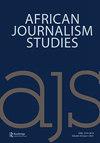Technology Innovation and Digital Journalism Practice by Indigenous African-language Newspapers: The Case of uMthunywa in Zimbabwe
IF 1.8
3区 文学
Q3 COMMUNICATION
引用次数: 3
Abstract
ABSTRACT This paper analyses institutional, contextual and human agency factors that affect technology innovation and adoption of digital journalism practices by indigenous African-language newspapers focusing on uMthunywa, Zimbabwe. uMthunywa, a legacy newspaper, positions itself as a digital-only news outlet after it was forced to stop printing in May 2020 due to a hotchpotch of political economy challenges exacerbated by the COVID-19 crisis. The conceptual framework of digital journalism is used to provide a benchmark against which to measure uMthunywa's adoption of new digital journalism practices. The critical theory of technology counters attempts of universalising technological innovation and digital journalism practice in newsrooms by viewing technologies as biased and contextual. Based on interviews and virtual ethnography, the paper finds that technological innovation at uMthunywa is very limited and there is a selective adoption of new digital journalism practices that contribute to the newspaper's survival. It is argued that a conservative organisational culture punctuated by technophobia and poor capitalisation are some of the barriers to technological innovation while lack of requisite digital skills by staff limits the adoption of new practices. The article contributes to debates about journalism innovation and the practice of digital journalism in Africa by indigenous-language newspapers.土著非洲语报纸的技术创新和数字新闻实践:以津巴布韦uMthunywa为例
摘要本文分析了影响津巴布韦乌姆图尼瓦土著非洲语言报纸技术创新和采用数字新闻实践的制度、背景和人为因素。《uMthunywa》是一家传统报纸,由于新冠肺炎危机加剧了一系列政治经济挑战,该报于2020年5月被迫停止印刷,并将自己定位为一家数字化新闻媒体。数字新闻的概念框架被用来提供一个衡量uMthunywa采用新的数字新闻实践的基准。技术批判理论通过将技术视为有偏见和有背景的,来对抗新闻编辑室中普遍化技术创新和数字新闻实践的尝试。基于采访和虚拟民族志,本文发现,uMthunywa的技术创新非常有限,并且选择性地采用了有助于报纸生存的新的数字新闻实践。有人认为,保守的组织文化中夹杂着技术恐惧症和资本化不足,这是技术创新的一些障碍,而员工缺乏必要的数字技能限制了新做法的采用。这篇文章为土著语言报纸关于非洲新闻创新和数字新闻实践的辩论做出了贡献。
本文章由计算机程序翻译,如有差异,请以英文原文为准。
求助全文
约1分钟内获得全文
求助全文
来源期刊

African Journalism Studies
COMMUNICATION-
CiteScore
1.90
自引率
10.00%
发文量
18
期刊介绍:
Accredited by the South African Department of Higher Education and Training for university research purposes African Journalism Studies subscribes to the Code of Best Practice for Peer Reviewed Scholarly Journals of the Academy of Science of South Africa. African Journalism Studies ( AJS) aims to contribute to the ongoing extension of the theories, methodologies and empirical data to under-researched areas of knowledge production, through its emphasis on African journalism studies within a broader, comparative perspective of the Global South. AJS strives for theoretical diversity and methodological inclusivity, by developing theoretical approaches and making critical interventions in global scholarly debates. The journal''s comparative and interdisciplinary approach is informed by the related fields of cultural and media studies, communication studies, African studies, politics, and sociology. The field of journalism studies is understood broadly, as including the practices, norms, value systems, frameworks of representation, audiences, platforms, industries, theories and power relations that relate to the production, consumption and study of journalism. A wide definition of journalism is used, which extends beyond news and current affairs to include digital and social media, documentary film and narrative non-fiction.
 求助内容:
求助内容: 应助结果提醒方式:
应助结果提醒方式:


